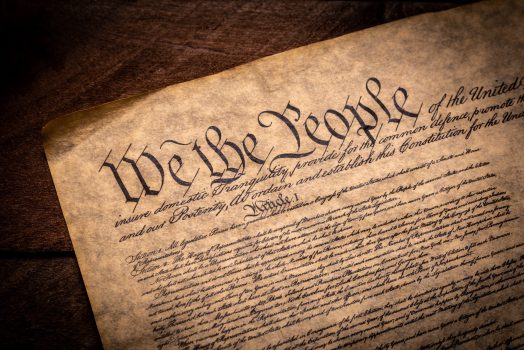
Christian Nationalist efforts to mandate the display of the Ten Commandments in public schools and other government buildings continue apace. Arkansas is the latest to require it.
American laws are supposed to have a secular rationale, yet the Ten Commandments are clearly a religious code, and their display has theological overtones. Yes, some of the commandments reflect commonsense laws that have appeared in societies throughout history (prohibitions on murder, lying and theft), but others reflect theological mandates (limiting worship to one god, requiring sabbath observances and bans on the creation of idols) that no one in a free society can be compelled to follow.
In a desperate effort to find some secular reason why the government should be required to post such a blatantly religious statement, Christian Nationalists often claim that the Ten Commandments are the basis of American government. They’re not, and this assertion was definitively debunked by 41 law professors and legal historians in a 2003 case from Alabama.
“Aside from a failed attempt in the seventeenth century to establish a biblically based legal system in the Puritan colonies, American law is generally viewed as having secular origins,” the legal brief explained. The scholars added that “various documents and texts” figured in the development of American law, among them English common and statutory law, Roman law, the civil law of continental Europe and private international law. They listed its primary influences as the writings of William Blackstone, John Locke, Adam Smith and others, as well as the Federalist Papers and other sources. (Learn more about the origins of the Ten Commandments in this interesting article by my colleague Bruce Gourley.)
So much for the Ten Commandments. What about the rest of the Bible? Did it influence American law? Again, the answer is no.
The evidence Christian Nationalists put forth is very weak. They often point to a passage in the Book of Isaiah that reads, “For the Lord is our judge, the Lord is our lawgiver, the Lord is our king; it is he who will save us.” This language, they argue, echoes the separation of powers found in the U.S. Constitution.
The passage, however, is wrenched from context. In his 2019 book The Founding Myth: Why Christian Nationalism is Un-American, Americans United Vice President of Strategic Communications Andrew L. Seidel points out that the following chapter talks about the Lord’s plan for a consolidation of power under one god. This is typical of the kind of governments found in the Bible – theocratic states and/or rule by autocratic kings.
Seidel goes on to note that we know where the separation of powers came from – and it wasn’t the Bible. As he writes, “It came from Montesquieu, who never mentioned or referred to the bible in his discussion of three separate branches of government.” James Madison makes this clear in Federalist 47, even calling Montesquieu out by name.
The final blow to the already reeling Christian Nationalist argument comes when we examine the debates over the Constitution and the text of the document itself. During the debate over the new American government, the Bible simply wasn’t raised very often. Seidel points to a study noting that the Federalists, who supported ratification of the Constitution, never cited the Bible. Not even once. The Constitution that emerged is secular. It contains no references to Jesus, God or Christianity but does guarantee no official establishment of religion and religious freedom for all.
If a Bible-based government had been the intent of the founders, we would know that. Chiefly, our Constitution would say it front and center. It doesn’t.
The Bible has certainly influenced American culture, and its impact on art and literature is easy to see. But no matter how loudly Christian Nationalists insist otherwise, it’s not the basis of our government.